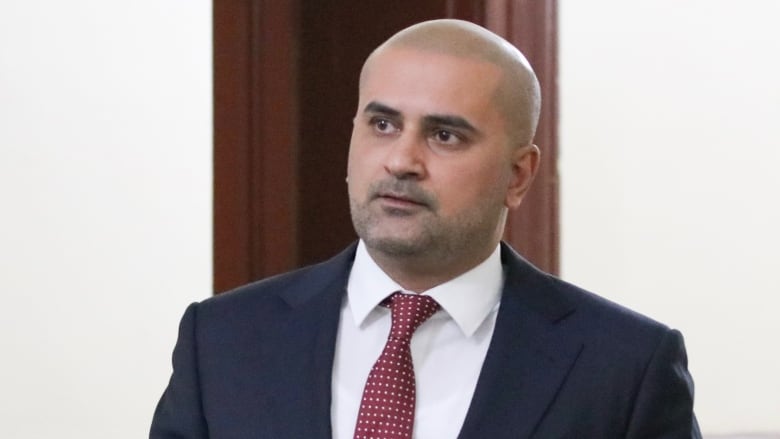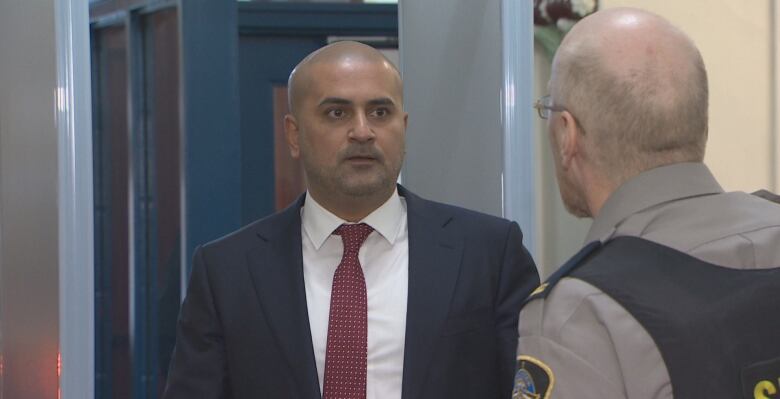DNA expert testifies at sex assault retrial of former Halifax cab driver
Bassam Al-Rawi accused of sexually assaulting passenger in back of taxi

The retrial of a former Halifax cab driver accused of sexually assaulting a passenger heard from an expert who analyzed DNA samples gathered from Bassam Al-Rawi and the womanwho was found unconscious and partially naked in the back seat of his taxi.
Al-Rawi was arrested in May2015 after police came upon the vehicleon a south-end street. The complainant's identity is protected by a publication ban.
On Monday, Martin Westecott, who specializes in analyzing bodily fluids, testifiedabout testing evidence gathered at the scene. There was no semen found in the woman's underwear, he said.
Westecott told the court a lip swab from Al-Rawi contained male and female DNA. While he didn't conclude the female DNA wasfrom the complainant, he said the probability that it came from someone else was one in 210 billion.
Under cross examination by defence lawyer Ian Hutchison, Westecott described the transfer of secondary DNA. He said DNA can be transferred by kissing and the amount that would be found on another area would depend on force and the amount of saliva involved.
Defence continues posing potential scenarios for the transfer of DNA. He asks whether the confined space of a car interior would make it easier. Expert says only if there is contact; close proximity is not enough. #nscourt
—@CBCBlairRhodesHe said it's difficult to get a good sample from urine, vomit or tears. It'spossible to transfer DNA by shaking hands, through hugging cheek-to-cheek and by wearing shoes, Westecott said.
Earlier in the trial, the complainanttestified she often took cash out for a cab. She also told the court the night of the alleged sexual assault she was so drunk she vomited.
There were four DNA profiles found in swabs from Al-Rawi's palms, but the samples were too small to yield any information about who they came from, Westecottsaid. It wasn't possible to determine if any of them contained the complainant's DNA, he said.
Westecott'stestimony started earlier this year in Halifax provincial court, but the trial was adjourned in mid-January after Al-Rawi had trouble following the translation. A new translator is working on the trial now.

Monday's proceedings got off to a slow start as the translator had to review and communicate Westecott'searlier testimony. CBC reporterBlair Rhodes was tweeting from the courtroom.
Most of the evidence in the trial has been presented in English, but Al-Rawi requested the complex discussion of DNA to be translated into his first language, Arabic.
Al-Rawi was acquitted at his first trial in March 2017. The case sparked a national outcry, including street protests and complaints about the conduct of the trial judgeafter he said in his ruling that "clearly, a drunk can consent."
The Crown appealed the acquittal and the Nova Scotia Court of Appeal subsequently ordered a new trial, citing errors the first judge made in law, including ignoring an ample amount of circumstantial evidence.
In January when the retrial started, the complainant told the court she doesn't remember the 11-minute cab ride from downtown to a south-end street far from her home in west-endHalifax. She told the court she had about eight drinks on an empty stomach over several hours.
The defence suggested the complainant may have initiated sex.
Al-Rawi also faces a second trial for allegedly sexually assaulting a woman in 2012.
With files from Blair Rhodes












_(720p).jpg)


 OFFICIAL HD MUSIC VIDEO.jpg)
.jpg)



























































































